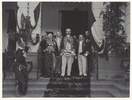Ethische politiek verbeeld als de christelijke beschavingsmissie
Alexander Willem Frederik Idenburg, een Nederlandse koloniaal met goede bedoelingen?
DOI:
https://doi.org/10.51769/bmgn-lchr.12778Abstract
This review article assesses Hans van der Jagt’s biography of the Dutch antirevolutionary politician and colonial official Alexander Willem Frederik Idenburg (Engelen uit Europa, 2022). Van der Jagt incorrectly depicts Idenburg as the figurehead of the Dutch colonial ethical policy at the beginning of the early twentieth century, while unduly idealising this policy. As is argued in this review article, this ethical policy was in effect instrumentalised as camouflage, concealing the perpetuation of the colonial intent -enforcement of Dutch rule, including extensive exploitation of land and people. Deriving from social concern about the impoverishment of the Indonesian population, the vast wealth amassed was intended to reduce the cost of the colony and help empower its inhabitants. Although this political mission was not realised, persistently referring to it served to justify ongoing Dutch rule both in the late colonial and in the post-colonial eras. In this article, I bring the disenchanting practices of the parties involved and their interests in sharper focus and I evaluate the role of Idenburg as the political centrepiece of this ethical policy. In the high-ranking colonial offices entrusted to him, he represented the anti-revolutionary doctrine in the policy pursued. Other operators, advocates and opponents of ethical policy alike, along with their motives, are addressed here as well, from the slow, cautious start of the ethical policy until its early eclipse.
Downloads

Downloads
Published
Issue
Section
License
Copyright (c) 2023 Jan Breman

This work is licensed under a Creative Commons Attribution 4.0 International License.
Authors who publish with this journal agree to the following terms:
a) Authors retain copyright and grant the journal right of first publication with the work simultaneously licensed under a Creative Commons Attribution 4.0 International (CC BY 4.0) that allows others to share the work with an acknowledgement of the work's authorship and initial publication in this journal.
b) Authors are able to enter into separate, additional contractual arrangements for the non-exclusive distribution of the journal's published version of the work (e.g., post it to an institutional repository or publish it in a book), with an acknowledgement of its initial publication in this journal.
c) Authors are permitted to post their work online (e.g., in institutional repositories or on their website) prior to and during the submission process.
Authors are explicitly encouraged to deposit their published article in their institutional repository.








